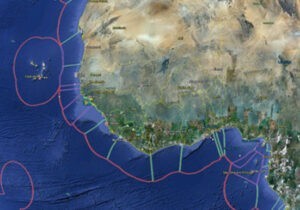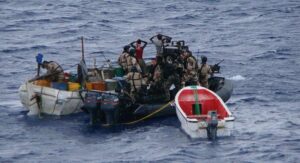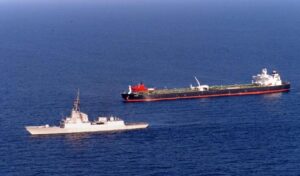Current and future involvement of the European Union
In 2014, the Council of Foreign Ministers of the European Union adopted a "Gulf of Guinea Strategy" and in March 2015 an action plan (time horizon: 2015-2020) to implement this strategy. Various EU Council working groups were involved in the development of the strategy and action plan under the leadership of the European External Action Service (EEAS), which comprises 67 individual actions. There was close coordination with international partners, in particular with the United Nations, three regional African organisations and a total of 19 African coastal states.
If the EU Gulf of Guinea Although the EU does not (yet) play a central role in this area, it wants and needs to become more active there with its strategy and action plan, using its rich array of civilian and military instruments.

For the development of a strategy and an action plan for the Gulf of Guinea there was a clear need for action: piracy, armed robbery, human trafficking and smuggling (people, drugs, weapons), illegal fishing, illegal diversion (oil bunkering) and theft of crude oil, all in all a highly "toxic mix" of criminal activities.
Some facts:
- Piracy activities in the Gulf of Guinea are between 15-19 % of attacks worldwide. In 2014, 24 incidents were reported, compared to three in the Indian Ocean and eight cases of brutal violence against crews, nine cases of firearms use and 66 crew members taken hostage. This compares to none in the Indian Ocean, 28 in the Strait of Malacca and 43 in the South China Sea (source: International Maritime Organisation, IMO).
- While piracy in the Horn of Africa has decreased significantly, particularly as a result of the EU operation EUNAVFOR Atalanta, but also with the help of the NATO operation Ocean Shield, the Combined Maritime Forces and the participation of other navies (Ukraine, New Zealand, Norway and "independent deployers" such as China, India, Japan and Russia), pirate attacks and armed robberies in the Horn of Africa have continued to increase. Gulf of Guinea increased dramatically. According to the NGO Oceans Beyond Piracy, 1035 seafarers were attacked in 2014.
- West Africa loses up to 1.58 billion US dollars per year due to illegal fishing.
- Over 9 million people in West Africa depend directly on fishing for their livelihoods and food.
- The cost to Nigeria of oil theft alone is estimated at USD 6 billion per year. In other words, around 10 per cent of the crude oil produced offshore is lost through theft.
- Lagos is the fastest growing city in the world in terms of population; by 2050, Nigeria will be the most populous country after China and India. Economic growth in Africa will be too low to absorb the rapid population growth.
- Europe imports around 13 % of its oil and 6 % of its gas from West Africa, with EU member states being the most important export market for most countries in the region.

On average, 30 to 40 EU-flagged or European-owned vessels are present in the waters of the Gulf of Guinea at any given time and are at risk of being targeted by pirates and criminals. Last January, a Greek sailor lost his life after a violent attack by pirates on a merchant ship off the coast of Ghana. In terms of statistics, it is estimated that around 70 % of criminal activity in the Gulf of Guinea are not reported and registered. The number of unreported cases is therefore very high. This is confirmed in particular by observations by the Spanish navy and investigations by Oceans Beyond Piracy. The Gulf of Guinea has always been a hotspot for piracy and armed robbery at sea, and the threat remains extremely worrying. The actions of pirates in the Gulf of Guinea generally considered to be more brutal than that of the pirates in the Horn of Africa, according to information obtained by the EU military staff, among others.
These developments and increasing maritime uncertainty in the Gulf of Guinea led to 2 UN resolutions - 2018 (2011) and 2039 (2012) - at the initiative of Benin, Nigeria and Togo, with the aim of calling on the coastal states in the Gulf to share responsibility for securing their coasts and to jointly define a comprehensive regional strategy. This resulted in two major events initiated by the African states, which were fully supported by the EU and led to the "Yaoundé Process".
The Yaoundé Process
In June 2013, the Yaoundé Summit of Heads of State and Government took place in Cameroon, attended by representatives of 25 West and Central African states and regional organisations. This was the first joint meeting of representatives from both regions and between three regional organisations: Economic Community of West African States (ECOWAS), Economic Community of Central African States (ECCAS) and the Gulf of Guinea Commission (GGC). There was a political and strategic will to move towards a stable and secure region in the Gulf of Guinea and led to the adoption of a "Code of Conduct" to address the threat from transnational organised crime in the maritime domain. This is defined as: Piracy and Armed Robbery at Sea (ARAS), money laundering, illegal arms and drug trafficking, illegal oil bunkering, crude oil theft, human trafficking, people smuggling, marine pollution, Illegal Unreported and Unregulated (IUU) fishing and illegal dumping of toxic waste.
This led to the establishment of an Interregional Coordination Centre (ICC) in Yaoundé in September 2014 to monitor the Yaoundé "Code of Conduct" by the three regional organisations and the decision to establish regional and multinational maritime coordination centres, which are now gradually being set up to cover the entire maritime space from Senegal to Angola, including the Cape Verde Islands and Sao Tome & Principe (this is exactly the same as in the EU's "Code of Conduct").Gulf of Guinea strategy).
The adoption of the Code of Conduct in conjunction with the creation of the ICC is referred to as the "Yaoundé Process", the "game plan" or "feuille de route" for the African and international partners.
The centre for maritime trade and information exchange for the Gulf of Guinea (Maritime Trade and Information Sharing Centre - Gulf of Guinea - MTISC-GoG), based in Accra, Ghana, began its work in March 2014 and is supported by some EU member states and other international partners. The MTISC-GoG transmits security alerts about suspicious incidents to ships. The centre highlights the importance of accurate maritime situational awareness and has gained the trust of the merchant shipping industry. It works together with the interregional coordination centre in Yaoundé.
What does a comprehensive approach mean for the Gulf of Guinea?
International trade is crucial for many African economies, with over 90 % of African countries' imports and exports travelling by sea. This figure is not unfamiliar to us Europeans from our own experience. Secure maritime transport is therefore essential for successful trade and economic growth. The Gulf of Guinea provides an economic lifeline for coastal and landlocked countries in West and Central Africa. Safe passage to ports in the region and safety in territorial waters is not only important for trade and economic prosperity, but also for the livelihoods of coastal regions and the protection of the maritime ecosystem. The entire maritime sector provides the basis for employment and livelihoods for a significant proportion of the African population in these countries.
The action plan aims not only to combat the symptoms, but also the causes. It offers opportunities to utilise the EU's various external financing instruments and the contributions made by the EU Member States in such a way that they complement each other. Here are just a few examples:
- The CRIMGO (Critical Maritime Routes in the Gulf of Guinea) project, worth EUR 4.5 million over four years, aims to promote the exchange of information as well as inter-agency cooperation and coordination at regional level in the Gulf of Guinea. Gulf of Guinea to improve maritime safety. The project has been extended until January 2017 and is a further €7.5 million measure to promote maritime safety in the Gulf of Guinea planned.
- Since 2009, the EU has provided around 50 million euros for the cocaine route programme in the fight against organised crime and drug trafficking. The "cocaine route" runs from Latin America and the Caribbean directly through the Gulf of Guinea.
- As part of the 11th European Development Fund (EDF, 2014-2020), around EUR 1.5 billion is being made available for regional indicative programmes for West and Central Africa. "Peace, security and regional stability" has been identified as one of the priority areas. These programmes include support for the Gulf of Guinea intended.
The Gulf of Guinea strategy and its action plan offer good opportunities for overarching cooperation with many Directorates-General of the EU Commission (including DEVCO: International Cooperation and Development; MARE: Maritime Affairs and Fisheries), with the EU Member States and other international partners, the International Maritime Organisation, Interpol, UNODC (United Nations Office on Drugs and Crime) and the US Africa Regional Command (AFRICOM). AFRICOM conducts the "OBANGAME Express" naval manoeuvre once a year in the Gulf of Guinea which not only involves naval units from countries in the region, but also from EU member states including the German Navy and partner states such as Norway and Brazil. Although not under the responsibility of the EU, navies from several EU Member States, the US and countries in the region have participated in various manoeuvres such as African Winds and Sahara Express since 2013 as part of the African Partnership Station, collaborating on training and capacity building along the West African coast. All these manoeuvres are very helpful in identifying gaps in capacity building and information sharing and are very well received by the navies in the region. They are explicitly emphasised positively in the EU Council conclusions on the action plan. The number of such manoeuvres should be increased and intensified in the future. The EU member states could support the West African navies in the planning and implementation of manoeuvres.
In view of the recently launched new EU operation in the Mediterranean (EUNAVFOR MED) to combat migrant smuggling and Operation Atalanta, both of which tie up or will tie up many maritime forces of the EU Member States, and other foreign policy challenges such as Boko Haram or Islamic State, a new CSDP mission/operation (CSDP = Common Security and Defence Policy of the European Union) is needed in the Mediterranean. Gulf of Guinea understandably unlikely at present, but not completely ruled out in the long term.
Nevertheless, the Gulf of Guinea A lot of the same risks are visible as in other regions, e.g. in the Sahel and the Horn of Africa: porous borders, fragile and unstable states, corruption and widespread unemployment, especially among young people, who become foot soldiers for pirates and other criminal gangs. Many Gulf of Guinea countries are a source of illegal migration to North Africa, which has an impact on the situation in the Mediterranean because traditional occupations such as artisanal fishing are no longer viable. By improving maritime security and the resulting reduction in criminal activities, the action plan aims to reduce migration and promote trade, stability and prosperity in the region.
As in the Gulf of Guinea In the absence of a CSDP mission or operation, it lacks the kind of status that would allow it to draw on more financial resources and involve EU agencies. This is why the EU is taking a realistic and innovative approach, but also a very ambitious one. The G7 ++ group, called "Friends of the Gulf of Guinea", which meets twice a year under current French leadership, aims to achieve better coordination of the activities of all international partners in support of the Yaoundé process.
The key role of the EU delegations on the ground must not be forgotten here in order to promote practical regional cooperation - with less policy and strategies and more encouraging the region to take practical action. The EEAS in Brussels has set up special contact points in all EU delegations for this purpose. There is a need to incentivise African partners to implement concrete measures on their own initiative. The EU can make important contributions here with its broad range of civilian and military resources - keyword "Comprehensive Approach". The lessons learnt from other scenarios - such as in the Horn of Africa and elsewhere through ongoing CSDP missions such as EUCAP NESTOR and EUCAP Sahel Niger - should be taken into account in the implementation of the action plan. The action plan also aims to strengthen civil-military synergies and improve the civil-military exchange of information. Nevertheless, particularly from a military-maritime perspective, the situation on the Gulf of Guinea The situation in West Africa is not directly comparable with that in the Horn of Africa, but shows many differences (see comparison table EUMS). One major difference is that, in contrast to the Horn of Africa (Somalia), there are functioning governments and security organisations in West Africa. Attacks in East Africa extend far into the Indian Ocean and the Arabian Sea, while in the Horn of Africa Gulf of Guinea Attacks on moving ships on the high seas are the exception and criminal activities are concentrated in harbours and coastal areas.

What could future steps be? What could a military contribution look like?
The European Union Military Committee (EUMC) provided military advice to the EU Political and Security Committee (PSC) as part of the development of the action plan. The basic understanding was that the military side would not take on a dominant role, but rather an advisory and supporting role within the framework of the Comprehensive Approach. The EUMC issued the following recommendations, among others, which were adopted by the PSC:
- The great importance of synchronising and coordinating all actions with all civilian and military actors in the Gulf of Guinea.
- Close coordination and exchange of information with AFRICOM to identify gaps in military capacity building in the region and avoid overlaps.
- The establishment of a "maritime surveillance architecture" that includes support for local navies and coastguards and other state authorities (police, judiciary, customs) in order to curb criminal activities at sea.
-

Maritime presence increases the safety of merchant shipping in the Gulf of Guinea. (Image: EU) Voluntary coordination of maritime presence of EU Member States operating under national command in the region, especially on the high seas, in order to contribute to a deterrent effect on pirates and criminals.
- Lessons learnt by the EU in the Horn of Africa and the western Indian Ocean are to be applied to the Gulf of Guinea can be utilised, even if the situations differ significantly in some cases.
- The military instruments of CSDP should play a role in the Action Plan, even if no CSDP mission/operation is currently envisaged. The military experience of the EU Member States is seen as an added value in terms of maritime capacity building, the provision of expertise and technical assistance, training, equipment and the planning of maritime exercises in the region.
Outside of my actual area of responsibility, I represented the military side of the EU on behalf of the High Representative at two conferences on maritime security in the Gulf of Guineain Lagos and Accra. I was able to gain an impression of the situation on the ground and can only sympathise with the worrying situation described in the Gulf of Guinea confirm. From my experience there, the key word is better coordination of the activities of the Gulf of Guinea States, both among themselves and internally. Many states are still taking a largely unilateral approach in the fight against piracy and crime and are not coordinating their existing resources and forces sufficiently. On the positive side, the EU enjoys a high profile in the region, as do individual committed EU member states, which means that the EU's support falls on fertile ground. The ultimate goal should always be for the states to help themselves one day in the sense of achieving complete "African ownership". The decisive factor in the future will be to combat the root causes of crime in an all-encompassing approach. With youth unemployment averaging 60 % across the region, it should come as no surprise that crime, along with other factors, is often the only way to survive.
Despite the EU's already wide-ranging involvement in Africa as a clear regional focus - of the 17 civilian missions or military operations currently conducted by the EU, nine take place on the African continent - the Gulf of Guinea should not be lost sight of. You shouldn't wait until the barrel is at the Gulf of Guinea literally explodes and gets completely out of control.
The region on Gulf of Guinea is made up of a rich palette of countries with plenty of prospects and opportunities to invest in the maritime sector and benefit from the source of maritime wealth right on their doorstep. One of the prerequisites for this is the establishment of maritime security. All preventive measures to establish maritime security will pay off in the long term. The EU can play an important role in actively supporting the West and Central African states, financially and in capacity building, in the spirit of an empowerment initiative to enable African partners to help themselves.
The EU should be ambitious in implementing the action plan for the Gulf of Guinea as part of the comprehensive approach.
In November 2015, an African Union summit on maritime security and development will take place in Lomé (Togo). The EU is actively endeavouring to make the summit a success. The EU will support the African Union in all its endeavours to continue the Yaoundé process, which could perhaps one day become a model for other African regions.
Author: Jürgen Ehle
Flotilla Admiral Jürgen Ehle is Chairman of the Working Group of the Military Committee of the European Union, Brussels.






